I love Padma's work. Several years ago, I reviewed some of her work and conducted an interview with her for this blog. You can find it here. Padma has also contributed to the blog by writing about YA verse novels. It is engaging; and she points us to some books that shouldn’t be missed. Take at minute to read or revisit the post.
This week she discusses diverse books from an international perspective with a specific focus on how diversity is represented children's and YA literature in Germany. She does a great job with the topic, so I will get out of the way and pass it over to Padma.
Germans Need Diverse Books, Too! by Padma Venkatraman
That said, one of the first things we did upon arrival was to pay for a membership at the local library. As we did so, I thought nostalgically about free libraries back home - the public library being, in my opinion, a cornerstone of American democracy. My ten-year old interrupted my thoughts with an observation. "Look at that book! It's racist!"
The book that she's pointing to is a picture book that has a problematic cover, showing an "Indianer" with a feathered headdress, a tomahawk and war paint on his face. Mistaking her horror for enthusiasm, the librarian is quick to bring out similar books, all of which depict characters who resemble Disney's Pocahontas; characters created by European authors who don't seem to have done a great deal of research and don't seem to have a great deal of sensitivity. My ten-year-old, who, since early childhood, has been exposed to the work of exemplary authors like Cynthia Leitich Smith and Joseph Bruchac, is astounded, and proceeds to lecture the librarian about stereotypes.

"Why?" she demands, and I tell her I want to know what she thinks of it.
My opinionated 10 year old declares that it is "really boring" and refuses to go beyond the first ten pages. I try it after she gives up, and I don't find it captivating either.
On our second visit to the library, we find another book with a non-white protagonist, this time written by an author who has an immigrant background: Das Mondmädchen by Mehrnousch Zaeri-Esfahani. This lyrically written tale interweaves fantasy with realism and we enjoy the poetic language as well as the beautiful black and white illustrations by Mehrdad Zaeri. But I can't find any more diverse books in stock in this library.
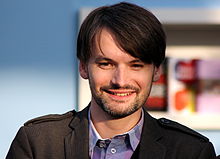 Saša Stanišić
Saša Stanišić So I start searching, somewhat haphazardly, for diverse kidlit whenever I can, during the next eight months of my stay. Granted, I don't conduct any kind of objective research. I wouldn't know how, anyway - after all my training was in oceanography, not social science. I just do a few searches on the internet, and visit libraries and bookstores wherever I happen to travel, and engage adults in conversation on this topic whenever I happen to think of it and the occasion seems right.
I'm pleased to discover a wide variety of books that qualify as immigrant literature in German for adults. Author Saša Stanišić, in the November 2008 issue of Words Without Borders, writes: Immigrant literatures are not an isle in the sea of national literature, but a component, both in the depths, where the archaic squids of tradition live, and on the surface, where pop-cultural waves hit the shore. And, as Professor Andreas Schumann states in an interesting article on the subject (https://en.qantara.de/content/new-trends-in-germanys-immigrant-literature-the-guest-who-is-a-guest-no-longer ), the Adelbert von Chamisso Prize, "awarded since 1985 by the Robert Bosch Foundation for "major contributions to German literature by authors whose native language is not German", is a reliable indicator of developments in what can no longer be called "immigrant literature" – from Aras Ören and Rafik Schami in 1985 to the 2005 laureates, Feridun Zaimoğlu and Dimitré Dinev." In bookstores, recent works of immigrant literature (like Melina Nadj Abonji's TAUBEN FLIEGEN AUF) are prominently displayed and staff seem well informed about the subject and recommend several authors and books. Librarians, too, seem well informed about the literary canon and eager to discuss "Migrantenliteratur."
At every bookstore, if I ask for children's books, I'm shown a section where I inevitably see many old European classics, like Emil and the Detectives (by Erik Kaestner) and the Pippi Longstocking series (by Astrid Lindgren), but not a single authentically diverse book. Instead, I see stacks of comics replete with offensive depictions of people of color. Granted, the authors of these comics are usually from other parts of Europe, not Germany; but they are certainly very popular in Germany, with readers of all ages.
Most upsetting, however, are the typical responses with which my concerns are met. Not that I ought to be surprised, but at least in America, thanks to the dedicated work done by the leaders of the #WNDB movement, librarians and teachers and booksellers seem more aware of the issue.
As for values - Emil and the Detectives is a book in which all the characters actively engaged in solving the mystery are white boys and the only girl character in attendance does nothing but bring the boys food and whine about the fact that she can't do anything adventurous because she's a girl, after all (and her job is to provide the men with material sustenance)!
As for Lindgren, I read and re-read the first Pippi book as a child - because, I suspect, it was one of the few who had a truly strong and adventurous female heroine. But even as a child, some of the humor in the book upset me. I detested the nonchalance with which Lindgren described Pippi's father's profession (which is still described in existing German editions of the book in terms that I find repulsive). Then again, of course I deeply respect and admire Lindgren's ability to create such a magnificently bold female character. When I suggest that most German children probably the book without ever being asked to question the rampant racism in it, I'm told Lindgren was just trying to be funny. Sure, it can be funny to laugh at another culture's expense. Sure, it makes some of us feel bigger and better if we decide "others" are somehow less important/beautiful/intelligent/humane etc. etc. But aren't there more refined ways to be humorous? Would a less culturally insensitive Pippi be a bad thing? Would it weaken her character if her crasser statements were substituted with equally raucous yet sensitive humor? I don't even bother mentioning something else I picked up on and wondered about - at least one of the thieves in one of the Pippi books has a "Jewish" name; a name that a Scandinavian friend said was not Scandinavian; a name that Jewish friend confirmed was indeed Jewish. And the odd choice of name gave me pause.
One evening, when I mention that Kaestner and Lindgren may not have had an entirely egalitarian idea of humanity as a whole, I manage to deeply affront a whole slew of Germans. Later, a German colleague knowingly describes it as "vertidigung der Kindheitserrinerung" - defense of childhood memories; and he's right - the incident is a testament to how deeply we identify with the books we loved as children. But although Kaestner and Lindgren have created characters that have stood the test of time, it doesn't mean that children should be allowed to consume every book they ever wrote without any reflection or discussion.
I'm not sure I'm making much headway. But I keep trying.
Why?
Because Germany has opened it arms to embrace a staggering number of immigrants, and that is admirable. According to an article in the Washington Post last year, 22.5 percent of all people in Germany are migrants or have at least one parent who is an immigrant and 38 % of all children under 10 in Germany are foreign-born or second generation. So all German children, whatever their culture, gender, or background, however they may choose to identify themselves, will surely live in a Germany more diverse than the one in which their parents grew up. In some cities, such as in Bremen, where I once lived, there's an even higher proportion of children with a “migrant background.” And I want to help these children settle down in their new home, even if their new home isn't my country. I want do what I can in the years left to me, to help young people build a future world where, I hope, diversity and multiculturalism will be respected and celebrated, and society will be more compassionate and more egalitarian. And one small way to help, I hope, is to promote dialogue on this topic, which is close to my heart, and to support increasing diversity in German children's literature.
| Award winning American author, Padma Venkatraman, has worked as chief scientist on oceanographic ships, explored rainforests, directed a school, and lived in 5 countries. Her novels, A Time To Dance, Island’s End, and Climbing the Stairs, were released to multiple starred reviews (12), received numerous honors (included in over 50 best book lists such as ALA Notable, Kirkus BBYA, and Booklist Editor's Choice), and won national and international awards. Her 4th novel, THE BRIDGE HOME has been scheduled for 2019 release by Nancy Paulsen Books (Penguin). Currently a fellow at the Hansewissenschafts kolleg in Delemnhorst, Germany, Venkatraman enjoys giving keynote speeches, serving on panels, conducting workshops, visiting schools and participating in author festivals worldwide. Visit her at: www.padmavenkatraman.com |
A Final Note from Steve
| I have to add a brief note to end of the blog. I just finished reading an Advanced Reader's Copy of Padma's newest book, The Bridge Home. It is written is for middle grade readers and they will love it. It would also work as a great classroom read aloud. I hope readers get their hands on this book. Thanks Padma. I am glad that you made sure that Sara LaFleur at Nancy Paulson Books made sure I had a copy. I am looking forward to share this book with my students. |

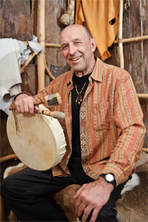
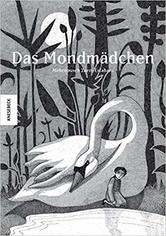
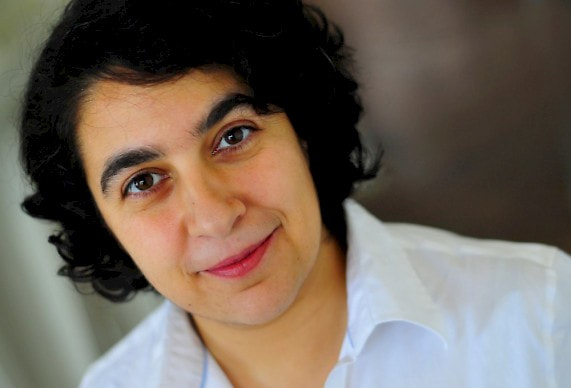
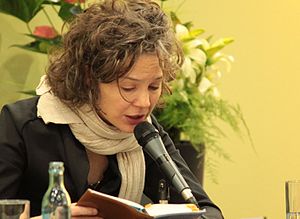
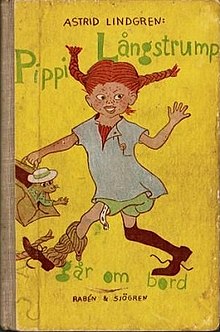
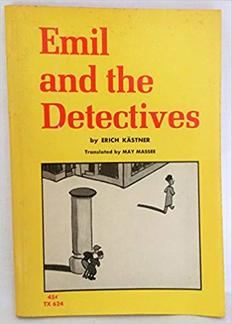

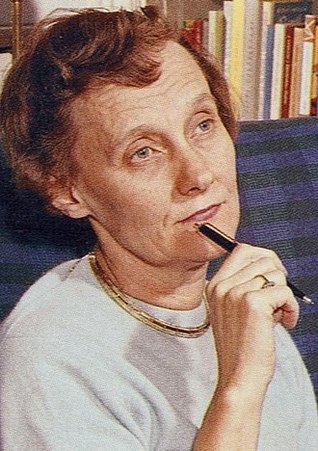
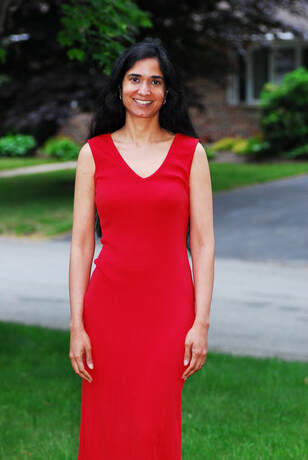
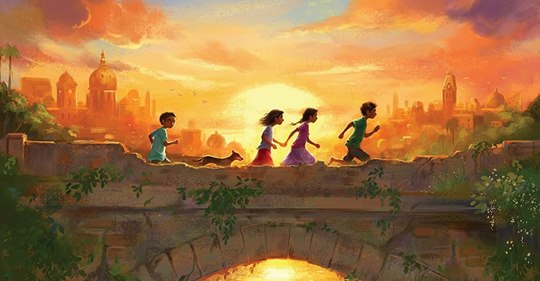
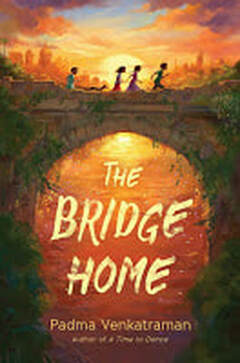

 RSS Feed
RSS Feed